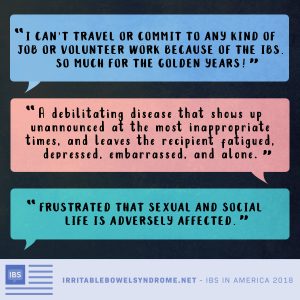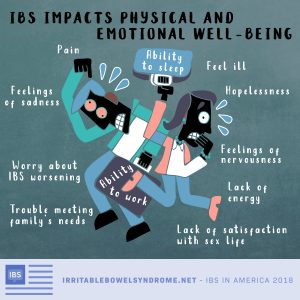Let’s Talk About IBS: What people with IBS want others to know
April 16, 2018
When it comes to irritable bowel syndrome (IBS), many of the physical symptoms of this chronic condition can be difficult to talk about. Many family and friends of people who suffer from IBS might not really know what their loved ones go through. With conditions like IBS that are “invisible,” many patients feel guilt and embarrassment when they are repeatedly told they look and sound fine.
IBS can cause gastrointestinal symptoms that have a substantial negative impact on one’s life, which is often amplified by the condition’s impact on a patient’s emotional well-being. The IBS In America 2018 syndicated survey conducted by Health Union gathered insights from over 1,500 people currently suffering from IBS to better understand the condition’s impact on their lives. The survey found that 45% of people with IBS are apt to experience anxiety or panic disorders, with stress also being a trigger for many patients. According to the survey findings, here are five of the top ways IBS impacts a patient’s emotional well-being.
Often accompanied with anxiety are feelings of sadness, and many respondents of the IBS In America 2018 survey conveyed that when asked about their quality of life. In an open-ended response, one respondent remarked, “I can’t travel or commit to any kind of job or volunteer work because of the IBS. So much for the golden years!” Many of the respondents are hoping and looking for help, with as many as 40% saying they wish they had help finding coping strategies and stress management techniques, while 34% wish they were receiving emotional support.
Lack of Satisfaction with Sex Life
The combination of physical and emotional symptoms from IBS can place a strain on people’s personal intimacy, according to IBS In America 2018. About four in 10 survey respondents admitted they were not at all satisfied with their sex life. Supporting that claim, a writer for IrritableBowelSyndrome.net discussed romantic relationships and IBS, confessing, “Whether it be the bloat, the sounds, or the smells, not only do we feel less attractive when we are having a flare up, we’re more than likely less attractive to our significant others. There’s nothing that can kill the mood more than IBS.”
Worry About IBS Worsening
Almost half the people surveyed were either very much or quite a bit worried that their IBS will get worse. IBS can commonly lead to health complications, with 84% of survey respondents already experiencing difficulties like hemorrhoids, acid reflux, and even malnutrition and anemia.
 Trouble Meeting Family’s Needs
Trouble Meeting Family’s Needs
A majority of respondents say they have trouble meeting their family’s needs on some level because of their physical condition. Many of the factors that cause this concern are due to lack of energy, pain, feeling ill, or not sleeping well—22% report not sleeping well at all—which often leads to missing work or other activities due to the severity and frequency of their symptoms. Stress is reported to be a trigger for IBS flare-ups, and concern over one’s job and family can create more stress, leading to a negative cycle of both physical and emotional symptoms.
Feelings of Nervousness
Many people with IBS live in a constant state of anxiety that their symptoms will appear at any given time, regardless of where they are or what time of day. One survey respondent in an open-ended question described IBS as, “A debilitating disease that shows up unannounced at the most inappropriate times, and leaves the recipient fatigued, depressed, embarrassed, and alone.” Dealing with the symptoms of IBS is an ever-present challenge, leaving people with IBS on high alert on a daily basis.
To learn more about irritable bowel syndrome and the annual IBS In America survey, visit our community at IrritableBowelSyndrome.net.
Discover the latest insights into patient experiences with IBS in the newest results from patient-generated survey, Irritable Bowel Syndrome In America 2019.




